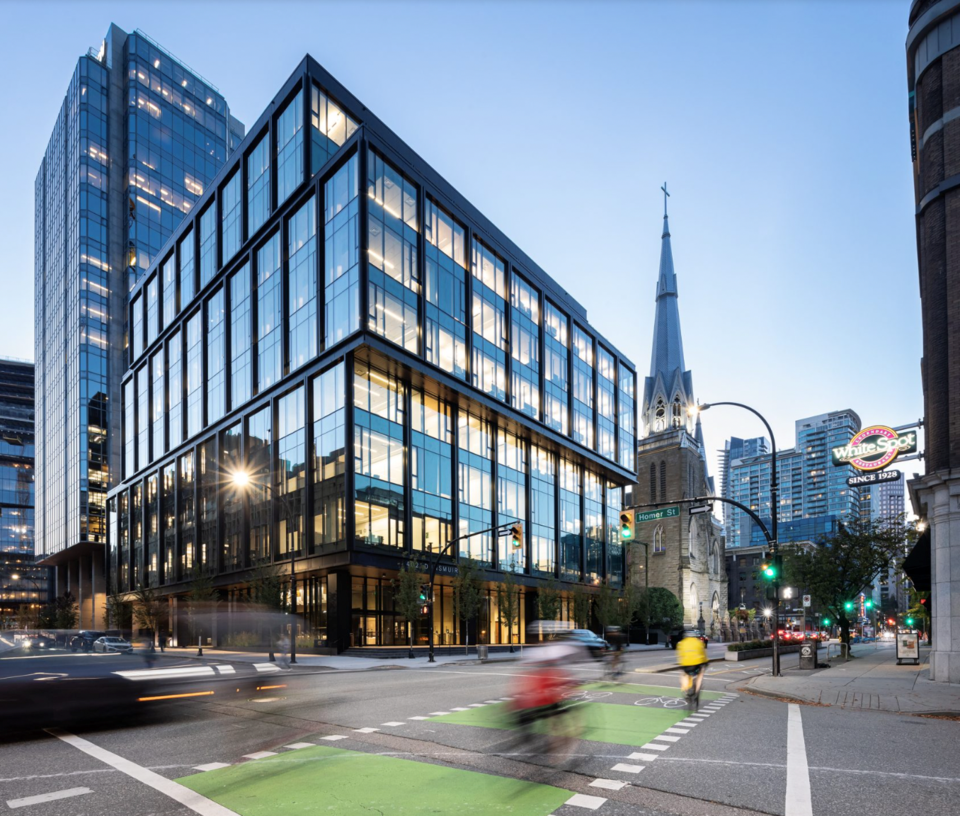With the uncertainties of a Trump presidency priced into capital markets, the year ahead promises steadier economic times and a normalized environment for Vancouver real estate.
Data presented as part of CBRE Ltd.’s outlook event in Vancouver, Nov. 6, pointed to growing confidence among real estate tenants and investors, with lengthening lease terms on downtown office space and a balanced market on the horizon.
“The downtown office vacancy rate has historically been around 7 per cent and we are on track to approach this figure given that no significant new supply is expected for the next four years,” said Jason Kiselbach, managing director and executive vice-president with CBRE in Vancouver.
CBRE pegs downtown Vancouver vacancies for the third-quarter at 11.8 per cent, even with a year ago.
Triple-A space saw vacancies decline in the period, falling a percentage point to 11.3 per cent.
This is supporting optimism in normalizing conditions, even as landlords continue to offer incentives to tenants that push down net effective rents. A further 1.4 million square feet must be absorbed before vacancies return to historical norms, a process that could take up to three years at standard rates.
But the timeline is shorter for triple-A space, at just 18 months. With triple-A space seeing the strongest demand in CBRE’s third-quarter numbers, Kiselbach mused whether a new downtown office tower is likely before downtown vacancies fall to 7 per cent.
(Hines has told Western Investor that its 1166 West Pender project with Reliance Properties Ltd., is ready to go, pending pre-leasing commitments, but a construction timeline has not been set.)
Capital is in the offing. While some have spoken of “recession of capital” as investors stuck to the sidelines, big deals have returned to the market with CBRE tracking 15 investment deals greater than $50 million in the first nine months of this year. These include the sales of 401 West Georgia Street and 402 Dunsmuir Street in downtown ($300 million); 100 Forester Street in North Vancouver, the region's biggest industrial trade ever ($145 million); and the Safeway site at 2315 West 4th Avenue ($90 million).
The activity is fuelling anticipation of cap rates beginning to compress across asset classes in 2025.
The one asset class that remains challenged is residential development land, which has seen underwhelming activity 75 per cent below a year ago. This is in turn affecting delivery of new residential units to the market, further exacerbating the region’s housing crisis.
A panel discussion following Kiselbach’s presentation pointed to a slow recovery for residential activity, with normalized conditions unlikely before 2026.
“There’s going to be skepticism, and 2025 is going to be a reset,” said Bob Rennie, founder and executive director with the Rennie Group, one of four participants who joined Kiselbach on stage for a wide-ranging discussion. “I don’t think we’re going to be able to push prices until we get to the first or second quarters of 2026.”
While there’s been a lot of optimism in the wake of COVID, Rennie noted there has yet to be definitive fulfilment as interest rates and inflation have played havoc with consumer and investor sentiment.
The outcome of the U.S. presidential election the previous night has thrown a further wildcard into a deck many feel is stacked against ÎÚÑ»´«Ã½, which faces greater headwinds than other economies.
Rennie agreed with other panellists – they included Janice Lin, managing director of Blackstone Inc.; Benjamin Tal, managing director and deputy chief economist with CIBC; and CBRE chair Paul Morasutti – that Trump may bark policy rather than bite U.S. partners, but sentiment will remain cautious.
Dampened sentiment is masking the relatively positive state of the Vancouver market, and the county at large. Panellists noted that very few asset classes are over-supplied yet rental rate growth is moderating even as demand picks up. And that demand is supported by near-shoring and on-shoring, initiatives the new U.S. administration is set to champion.
“My concern next year is what happens with the economy, because our industrial performance is very closely tied to that,” Morasutti offered. “But long-term, I have no concerns about the industrial sector.”
Most concerns are likely manageable given the relatively favourable state of the Vancouver market, where vacancies lag major centres across North America. This means next year’s uncertainties should have minimal impact.
“I think it’s manageable but we’ll probably have to get to 2026 to get through,” Rennie said.


